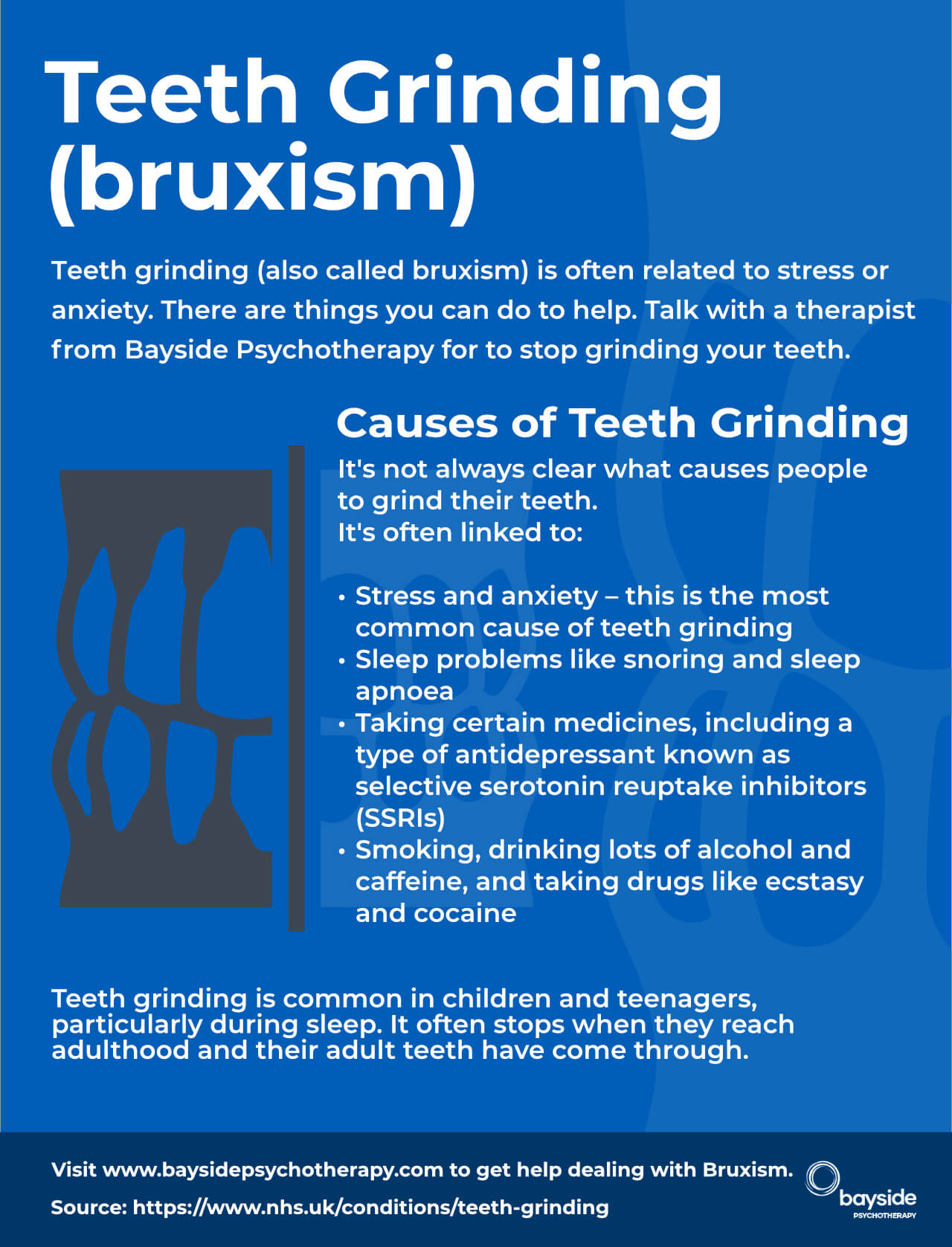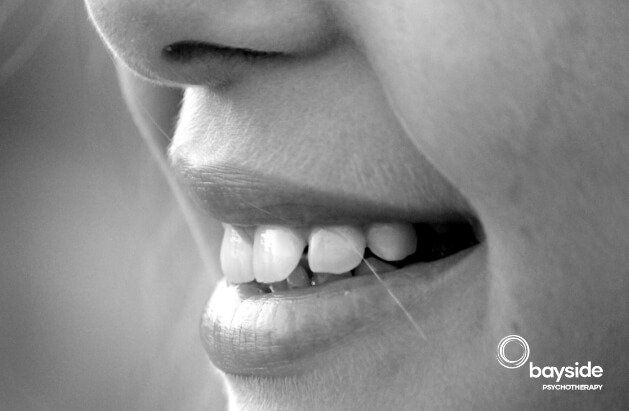Do you grind your teeth? Tooth grinding, or Bruxism, is a common habit. A lot of people suffer from teeth grinding or clenching and do this while they’re asleep and many do it while they’re awake as well. It’s one of the classic examples of a person’s inner turmoil coming through in their physical habits.
There are plenty of reasons to stop grinding your teeth. Tooth grinding can be painful, and lead to TMJ (trans mandibular joint) syndrome, as well as tooth damage and enamel erosion. Anxiety, anger and stress could be playing such a large part in your daily life that you clench your jaw and grind your teeth without even realising it. Your dentist may be the one who alerts you to the problem.
The trained therapists at Bayside Psychotherapy have expertise in various treatment methodologies, including hypnotherapy, deep relaxation, Cognitive Behavioural Therapy (CBT), psychodynamic psychotherapy and others. Seeking help to understand what is causing the suppressed emotions that lead to tooth grinding may be an effective way of stopping it.

Why Do Some People Grind Their Teeth?
Teeth grinding also known as Bruxism is the grinding and involuntary clenching of the teeth. Teeth grinding can occur during the day (awake bruxism) or at night (sleep bruxism). There are many reasons why people grind their teeth:
- Stress and Anxiety
- Sleep-Related Disorders
- Bite Misalignment
- Lifestyle Factors
- Parkinson’s Disease and Huntington’s Disease
- Genetics
- Reflex Activity
- Other Disorders
Frequent or severe grinding of the teeth often leads to dental health problems, such as tooth wear, increased tooth sensitivity, and even loss of teeth. It can also lead to jaw disorders and headaches. If you suspect you or your child is suffering from Bruxism it is important to consult with a dentist or healthcare professional for proper diagnosis and management.

How Do I Know If I Grind My Teeth?
For Dental Professionals
Tooth Wear and Damage:
One of the most evident signs is damaged teeth or flattening of the teeth. If it is very severe you might also notice small fractures/chips in the enamel.
Jaw Pain or Tightness:
Waking up with sore jaw muscles, having a constant dull ache in the jaw can be a sign of grinding at night whilst sleeping.
Headaches:
Suffering from headaches in the morning, specifically around the temples, can be a sign.
Tooth Sensitivity:
If you notice increased sensitivity to hot, cold, sweet, or acidic foods and drinks, it could be due to the enamel wearing down from grinding.
Audible Grinding:
If a partner or family member has heard you grinding your teeth while sleeping, it’s a direct indication of bruxism.
Disrupted Sleep:
Bruxism can also cause a person to wake up during the night or experience unrestful sleep.
Locked Jaw or Limited Jaw Movement:
People who clench their teeth constantly may end up with limited jaw movement, making it hard to open or close the mouth. Jaw clenching can also lead to headaches.
Fatigue or Sleepiness:
Chronic disruption of sleep due to grinding might leave you feeling tired during the day. Sleep disorders may also develop.
Clicking or Popping Sound:
Hearing a clicking or popping sound in the temporomandibular joint (TMJ) can be a sure sign of Bruxism. Listen out for the noise of teeth grinding.
Considering Hypnotherapy for Bruxism?
Start Now
Seeking Treatment With Bayside Psychotherapy
If you suspect you grind your teeth, it’s essential to see a dentist or speak to a member of our team at Bayside Psychotherapy to get the professional help you need. They can help you confirm the presence of bruxism and suggest appropriate treatment options to help manage or reduce the grinding.
Do you have any questions for us? Get in touch with us through our online contact form.
Call Bayside Psychotherapy on (03) 9557 9113 to find out if we’re able to help you. Your call is completely confidential, and there’s absolutely no obligation.
You can also book an appointment by using our online booking form for online appointments. Or, if you prefer, you can book an in-clinic session.
Self-hypnosis may also work well when used in conjunction with counselling. You can download our Teeth Grinding Self Hypnosis recording from our website.
What Causes Teeth Grinding?
The root cause of teeth grinding isn’t always clear. However, it’s usually linked to stress, anxiety and sleep issues. Teeth grinding often happens either during sleep, stressful situations or while concentrating. Most people who grind their teeth and clench their jaws aren’t always aware they’re doing it as it doesn’t always cause symptoms.
What happens if teeth grinding is left untreated?
Bruxism may lead to cracks or fractures of the teeth. Tooth enamel can wear away leading to tooth decay and even tooth loss. If it is not dealt with, it can even lead to jaw muscle and jaw joint problems.
How Long Does Bruxism Treatment Take?
Some clients may find they’re able to get to the root cause of their bruxism problem remarkably quickly. For others, either the underlying psychological issues or the engrained physical habit may mean a longer course of treatment is indicated to maximise the chances of lasting change. Your willingness to commit to counselling will make a big difference to the duration and success of your treatment. Those who are able to overcome bruxism not only protect their teeth but often find that they cope better with anxiety and get a better night’s sleep.
Is grinding teeth a form of anxiety?
Awake bruxism can be caused by anxiety, stress, anger, frustration or tension. Grinding of the teeth can also be a coping strategy or a habit during deep concentration. Sleep-related chewing activity is often associated with arousals during sleep causing Sleep Bruxism.
How Does Bayside Psychotherapy Treat Bruxism?
At Bayside, we don’t believe in a cookie-cutter approach to counselling. Our experienced therapists draw from various therapy traditions to create a blended, customised program to suit you. We will endeavour to work together with you to examine the stressful thoughts and emotions that may be causing you to clench your jaw and grind your teeth, and then work to address them. We’re flexible and work hard to make sure you feel comfortable about the progress you make and the pace of your therapy. Results vary, and we cannot guarantee specific outcomes.
Do you have any questions for us? Get in touch with us through our online contact form.
Call Bayside Psychotherapy on (03) 9557 9113 to find out if we’re able to help you. Your call is completely confidential, and there’s absolutely no obligation.
You can also book an appointment by using our online booking form for online appointments. Or, if you prefer, you can book an in-clinic session.
Self-hypnosis may also work well when used in conjunction with counselling. You can download our Teeth Grinding Self Hypnosis recording from our website.
Note: Whilst we will do our best to assist you, we rely upon your commitment to and participation in the treatment process to optimise results. Although some of our therapists work with people presenting with this condition, no guarantees of any outcomes can be made.
Reception Phone Hours
- Monday 8:30am to 5:30pm
- Tuesday 8:30am to 5:30pm
- Wednesday 8:30am to 5:30pm
- Thursday 8:30am to 5:30pm
- Friday 8:30am to 5:30pm
Closed on public holidays
Choose your own date and time for an online or in-clinic session
Therapist Hours
- Monday 8:00am to 8:00pm
- Tuesday 8:30am to 8:00pm
- Wednesday 8:30am to 8:00pm
- Thursday 8:30am to 8:00pm
- Friday 8:30am to 8:00pm
- Saturday 8:00am to 6:00pm
Closed on public holidays







